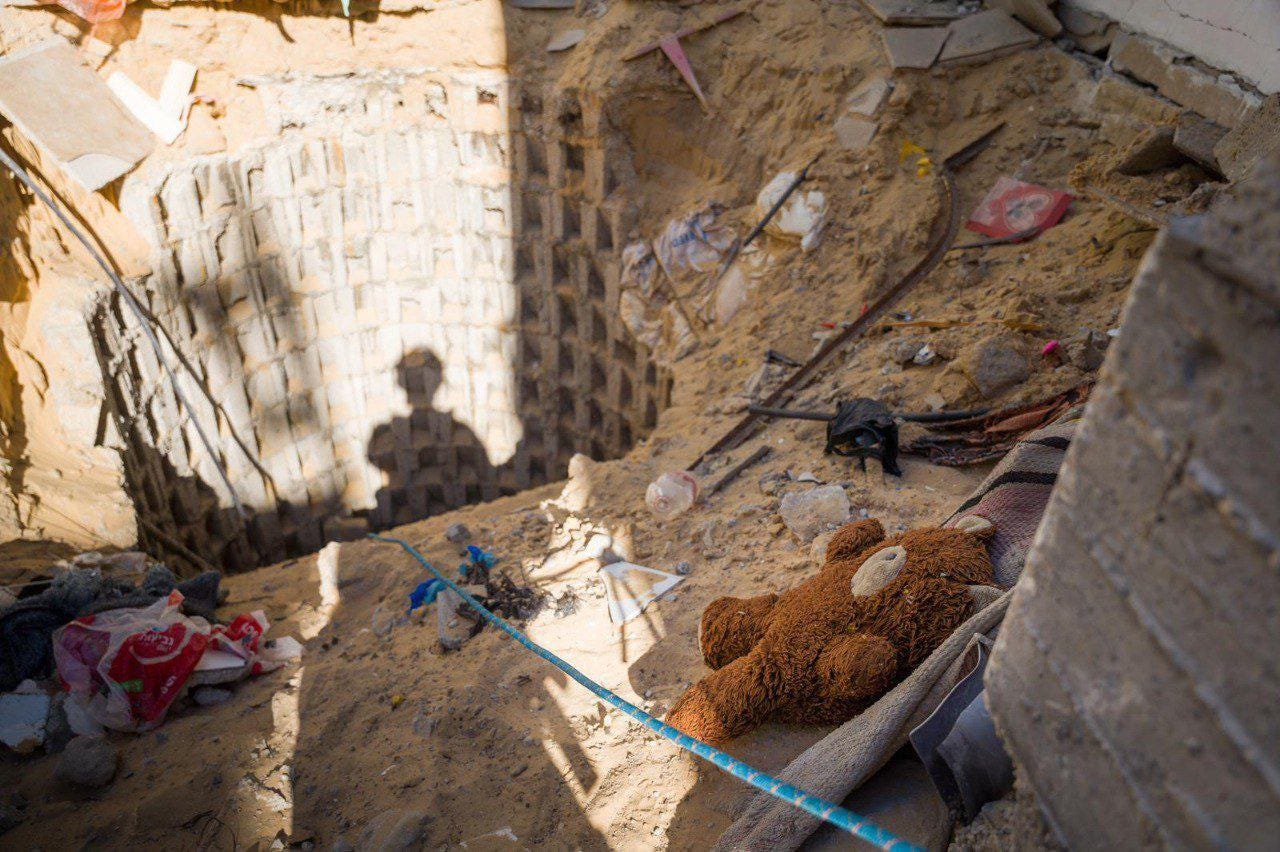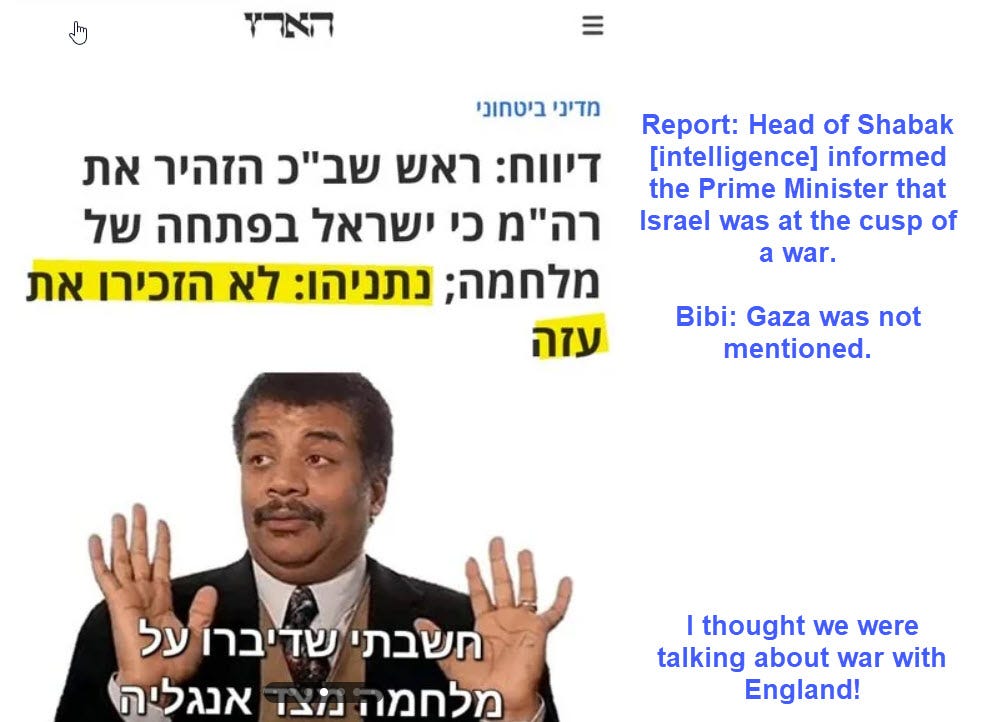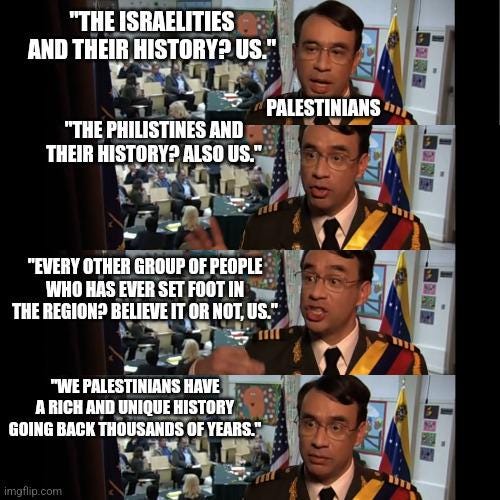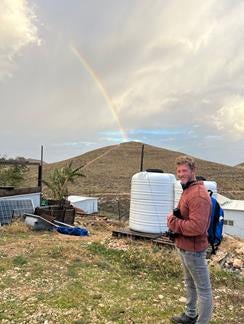First Time Here? Readers suggest starting with the expanded Gaza Explainer in #133 and #120.
Updated 2024/09/10 after email publication: Video added to the "Gaza Tunnels" section (accidentally cut during final formatting); In "Relief Alef" the video itself was mildly enhanced (holding the final frame) and the intro text expanded.
Tags: 6-12 min read; Videos
Back in Israel after a month of travel in the U.S., one of the first things I did was attend the Shiva of the Goldberg-Polin family. Yes, I stood in line to sit with them. Yes, I sat with them. No, I could not come up with anything to say. Photography is not appropriate at such an event, so here are photos of the banners on the tent walls... They are from an anti-racist/anti-fascist group of soccer fans that Hersh was part of (FaceBook page; Instagram of sister organization):
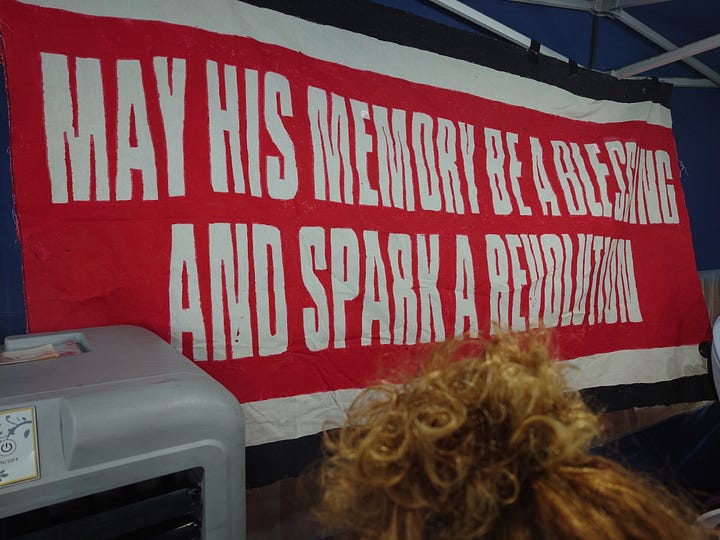
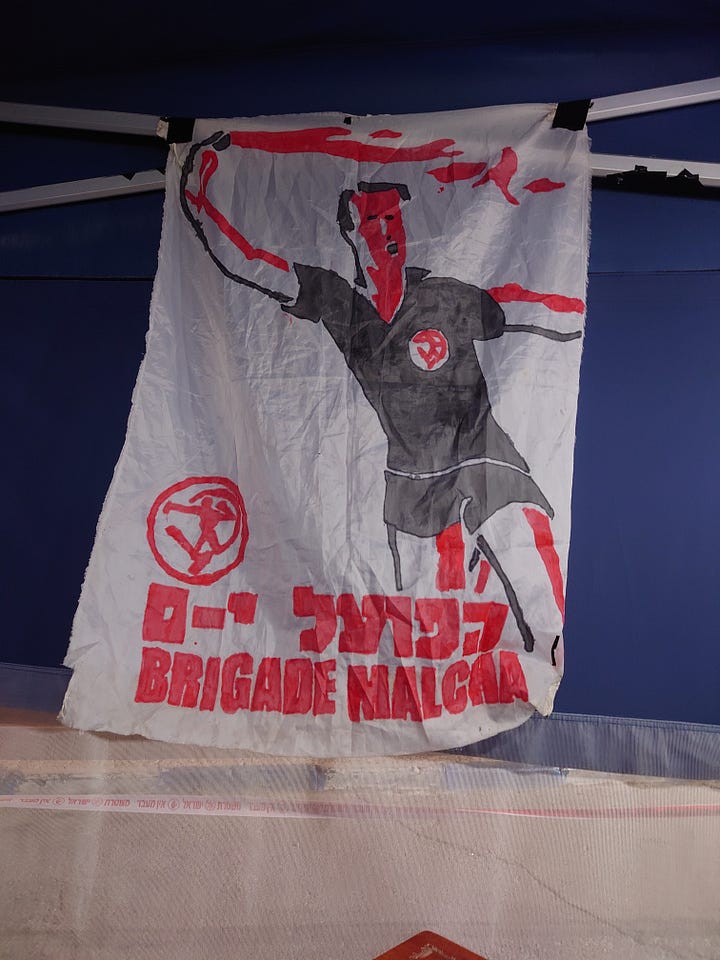
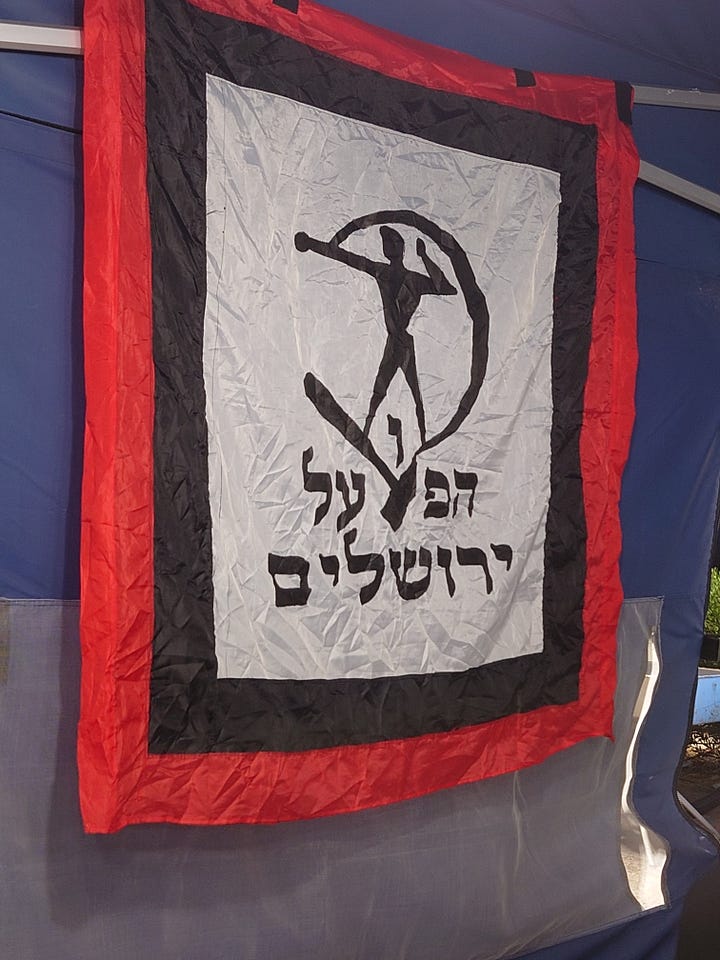
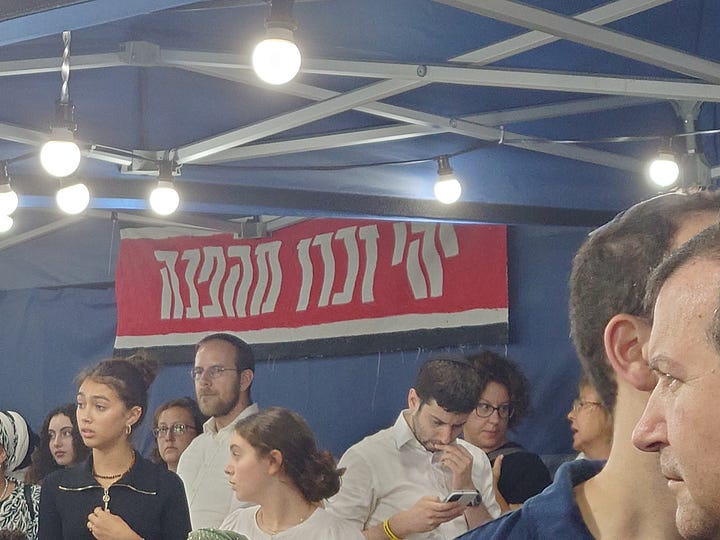
Outside the Shiva tent:
Mail
S.D. asks: About That Quote in #135...
... my father used to say exactly what your mother did, a people gets the government that it deserves. Maybe that was a Fasman thing? In any case, I giggled when you quoted your mom about it.
Question not addressed in the piece about Hamas manipulating polling numbers: Shakaki is, as far as I know, generally regarded as a professional. So if Hamas manipulated his figures, why hasn't he spoken up?
An important question that is ignored by the media.
The reason is straightforward: Hamas is a mafia gang and enforces a code of silence. Criticizing Hamas is punishable by beatings and summary execution: Of you and your family. Haaretz recently published a piece in English (PDF here) based on interviews with Gazans on exactly this topic. Excerpts:
"There is fear of speaking in public about Hamas members, even ones who were killed, for many reasons," said Assam (a pseudonym, as are the names of all the interviewees in this article). He is 38, from Khan Yunis and left the Gaza Strip for Egypt in November. His main reason was the "fear of being seen as collaborators" and a fear of harassment by Hamas, he said.
Assam confirms that the unofficial code of silence has grown much more powerful since the war broke out. Hamas expects a total lack of criticism from locals, considering it to be "treason" that would serve the Israeli security forces. People pass on information about the deaths mostly by word of mouth. "Hamas releases the names of the organization's dead" only in rarest of cases, he said. "The population doesn't post them, not even the families."
The Haaretz article goes on to note that Hamas' Gaza casualties are hidden, for example, by listing Hamas' dead as women and under fake ID numbers (on the casualty lists). This is in contrast to Hamas' casualties in the West Bank, which are publicized with names and photos. Hezbollah, in Lebanon, also publicizes its casualties. (Martyrdom is celebrated.)
Why Not Publish Casualties in Gaza?
Because the battlefield of the Gaza war is in the media (conventional and social). Gaza is hybrid aka new generation warfare, as first articulated by Russian General Gerasimov in 2013. Defeating the Israeli Army is not the goal of Hamas. The goal is to degrade Israel in the eyes of the world. Or, to cite one of the key proposals of General Grasimov's essay:
At times, nonmilitary methods are more effective than military ones.
This is done by creating stories and images that are picked up and amplified by conventional and social media. Since media is in the business of generating rage (as dear friend N.B. recently schooled me), rage-provoking images and stories are catnip for media new and old.
How is Hamas achieving this victory? By burying the most attack-resistant fortress in human history under densely populated cities in a small enclave that is fenced by its two neighbors. Due to hatred and racism by the Arab world, the people cannot migrate to a neighboring country (as Africans, Iraqis and Syrians have in their millions in the past dozen years or so). Hamas sits in its tunnels, impervious to all but a small team of Israeli tunnel warfare commandos, and lets the camera-phones roll.
Not a bad strategy.
On Warfare
Which brings us to the psychological aspect.
This is a war of mindshare (in the West) and fear (in Israel), not tanks or fighters. Hamas makes it difficult for IDF soldiers to be humane (hiding among and shooting from civilian areas) and puts the bravest soldiers at risk (particularly the anti-tunnel units of the Yahalom division--Yahalom means "diamond").
Six Israeli hostages were recently murdered by their Hamas captors. After the successful hostage rescue of a few months ago, Hamas leadership ordered that when the IDF approaches, hostages should be killed. These six are the first known victims of this policy. A Yahalom unit was exploring the tunnel complex under Rafah (here it is, months after Rafah was taken by the IDF and the tunnels are still being figured out). A Hamas unit detected them, killed the hostages, and disappeared into the background of Gaza.
The Yahalom unit was left to discover the bodies of the hostages.
Now imagine being the mother of one of those Yahalom soldiers. He comes home for the weekend (as most soldiers do--the front is just a 1-2 hour drive away). You are doing his laundry. His uniform is stained with the blood of the hostage-corpse he carried out of the tunnel.
That is a domestic aspect of the psych war. (As related to me by a friend of that mother.)
Among 20-somethings in the U.S. it might sound like this: "Israel uses F-35's against Gaza!" True, but not useful. Israel could drop bombs on Gaza from Cessnas, as Gaza has no air force or anti-aircraft system. The catch? There aren't any Cessnas that can carry bombs. Israel uses F-35's because that is what the IDF has, not because that is the nature of the war.
But the war as seen on social media says: “Israel is using F-35’s against unprotected civilians in Gaza” creating anti-Israel rage with a fact so incomplete as to be a lie. (The rest of the fact: The building bombed had no people in it because the IDF gave evacuation notices and even a “knock on the roof;” and/or: The building bombed had been clearly identified as a Hamas combat command center and was bombed when there were nearly no civilians in or near.)
Gaza Tunnels
The tunnel shaft leading to where the six murdered hostages were found:
IDF report: The shaft leading to the tunnel in which the bodies of the hostages Carmel Gat, Eden Yerushalmi, Hersh Goldberg-Polin, Alex Lobanov, Almog Sarusi, and MSG Ori Danino were recovered from was located next to stuffed animals and wall art of cartoon characters in a children’s play area.
The troops of the 162nd Division and the ISA located the shaft leading to the tunnel in an area surrounded by the enemy and extensively booby-trapped. This is a further example of how Hamas abuses civilian areas to hold hostages and carry out its terrorist activities.
A Yahalom soldier discussing the tunnel. 1 Min. English.
On Hamas
There have been a number of incidents published on Palestinian social media of Gazans who speak out against Hamas on social media and are then visited by Hamas gangs who break their limbs. For example: In early July, a prominent Gazan social activist, Amin Abed from Jabaliya in the north of the Gaza Strip, was attacked by a gang of 20 masked Hamas men who broke his arms and legs (pictured below) after he posted on Facebook in favor of ending the war and against Hamas's stupid way of conducting the war.
This is not an isolated incident. In the past couple of weeks a Palestinian asked in a video shared on Al-Arabiya network, that he and the Gazans be saved from Hamas before being saved from the hands of the Jews. Some days later, according to Gaza sources, Hamas operatives found him and broke his limbs.
Two weeks ago, Bari Weiss published an interview with a Palestinian critic of Hamas who lives in fear because he has spoken out against the methods of Hamas.
Or, as Thomas Friedman recently put it, Hamas is the very worst of Palestinian leadership.
Postmark
Lebanon
A continual barrage of IDF attacks. This is what it looks like when the IDF "gets it right" -- secondary explosions, or, in this case, rockets shooting out at random. (From attacks in the area of Zibqin and Chihine in southern Lebanon on Sept 3.)
Additional strikes in Lebanon in the past few days:
And similar hits on rocket and weapon storage in Masyaf, Syria on the night September 8. (Hezbollah's arsenal in Lebanon is supplied by Iran via Syria. While this IDF attack took place in Syria, it is an attack on Hezbollah, not the Assad regime. There have been many strikes like this in Syria. Syria does not retaliate.)
Relief Area
Alef: Meme Time: Likudniks Just Now...
(The shirts and signs say “Netanyahu” or “Likud.” — This is a spoof on both the perennially optimistic Omer Adam—a king of Israeli pop and apparent Likud supporter—and Bibi-fans/Likud.) 30 Seconds, Hebrew w/English subs by Raf.
Bet
Gimmel
“Do you think Netanyahu should be a candidate in the next election or should this be his last time in office?” 69% say: Bibi, Retire!”
Bibistim (Bibi fanatics): Why are you looking at anyone else? More Bibi! More Bibi!
Dalet
For concluding remarks, today we use an essay by a young Israeli, published by the Bronfman Fellowship.
On Optimism: Maayan Or Hoch
My name Maayan Or, [participant of the Bronfman Amitim program 2019]. I’m 22 years old, from Kibbutz Kabri in the north of Israel. I enjoy reading philosophy, playing music, and hiking. My dream is to travel to Mongolia and China. I began my military service two and a half years ago as a psychotechnical diagnostician, but I wanted to be a combat soldier, so I transferred to the Armored Corps. Last May, I was injured in combat in Gaza, and now I am in rehabilitation.
Tension and rehabilitation I have a leg injury and I spend two or three days a week receiving treatments at Tel Hashomer Hospital. The daily struggles are primarily around rehabilitation — doing physical therapy exercises, working on lifting the injured leg, and avoiding exposure to the sun because of the burns I have on my hand and leg. It's challenging in the Israeli summer.
Aside from that, there is the tension at home, up north. My kibbutz is not in the evacuated area, but it is very close to it. Everyone is on edge, and even the sound of a motorcycle passing by makes people turn their heads. On the other hand, even in the shadow of the threat and the tension about what will happen with the Iranians, people somehow continue with their lives. The tension feels almost absurd, because we’re all just waiting – waiting for something to happen or not happen. In the meantime, as a soldier who is no longer in the field, I am also worried about my platoon. I don’t follow the news on an hourly basis, but the fact that my friends are there is something that occupies my mind.
Gratitude There are positive things to be thankful for, and I now have much more appreciation for things that could easily be taken for granted, like, for example, sleeping without shoes after months of combat. There is also something – one might say it’s a chilling thought – in knowing that I am living through the most significant period of my generation. I am very aware of the number of stories I am accumulating. There are very sad stories, but there are also funny ones. For example, when I was injured and in a wheelchair, a friend asked me what I wanted to do, and I casually said that I wanted to learn to play the kamancheh (it's an incredible instrument from Azerbaijan, also played in Turkey—look up Mark Eliyahu). It's not a popular or cheap instrument, but he simply started a crowdfunding campaign and raised the money. And now I have a kamancheh.
There are also moments of nachas (satisfaction, peace) during this time. I truly feel the strength of solidarity within Israeli society, on many levels. People are stepping up to help, sometimes in ways that are almost a bit excessive. For example, because I live far away, there is an organization that has arranged for me and a few other injured soldiers to have an apartment in Ramat Gan so we can easily get to our physiotherapy treatments at Tel Hashomer Hospital. And when the neighbors heard that we were injured soldiers, they started preparing food for us about three times a week. There are people who just want to give.
Life beyond politics I feel that the reality I encounter daily is calmer than what is reflected through the media. That is, there is no doubt that the political situation in Israel is not good, but ultimately, I pick up Haredi hitchhikers near Tel Hashomer, have good relations with the Arab villagers near us in the north; and when I was injured and evacuated, I was treated by Arab nurses. I think something in the non-political, non-publicized space is much more cohesive. Maybe that cohesion has its limits, I don’t know. But my experience, looking around, is of a forward-looking perspective, an optimistic future for the State of Israel, beyond identity politics, and beyond a reality where everyone hates the leftists, the rightists, the ultra-orthodox, and the Arabs.
Questions of progressive identity Being left wing in a combat role is not simple. The friction with the civilian population – in Gaza or in the West Bank – is inevitable under these circumstances. I was definitely hesitant at first, but I think that in many situations, especially those involving civilians, I would rather have people like me out there than soldiers who use their power unprofessionally and with less self-control. Fortunately, the people I served with were principled and professional, but it still affected our conversations. I also felt that I took the situations to heart more than they did, as for some of them, it was simply another mission.
As someone who belongs to progressive circles, I now find myself preoccupied also with questions of identity and tension that I’m sure also exist in the U.S. – how close am I to liberal circles and what is the point of contention, and to what extent can I feel a sense of belonging to these circles when, in the end, I disagree with them on the question of Israel? It’s clear to me that I agree with liberal circles on issues like human rights, women's rights, and minority rights. On the other hand, I look at universities around the world, and I see how close they are to me in many areas of thought, but then they shout 'Free Palestine,' and I feel like all of a sudden we’re on opposite sides. I don’t want to feel different from them on other issues, but when this question arises, sometimes the thought that goes through my mind is, 'Wait, are they wrong about everything or am I wrong now, or… how can I live with this complexity?” It’s also a question of identity. I feel like I belong to both sides, and in the end, these values clash. So how can I live with both of them? These are the questions I’m asking, and they don’t have clear answers.
Where do we go from here? I think about the fighting in Gaza and ask myself, what should we do? Where do we go from here and what is the goal now? It’s clear that returning the hostages is a goal, and finding Hamas is a goal. But ultimately, in terms of practical means, I wonder how they can be achieved. It’s actually now that I am no longer in the thick of the fighting, that these questions weigh more heavily on my mind. How much longer? How much further? And I don’t have an answer. Not one.
Healthier ways of coping When I think about the ethos of the fighter and look at my generation, I believe we are much healthier mentally than previous generations. I see this both now, in rehabilitation, and when I was in combat. I see how many people feel comfortable sharing their difficulties. Even at a systemic level, I think there is a lot of awareness about mental health. For example, with fighters, there is a clear protocol for treating a soldier who’s gone into shock, while still in battle. We’re encouraged to see a mental health officer, to share what you’re experiencing, not just for those dealing with PTSD, just to unload. There’s something very interesting about this, because ultimately, the whole masculine military ethos – something about it is changing and becoming more inclusive. The fact that people talk about their mental state openly, share their dreams and difficulties, I think it indicates something quite healthy. I see around me how sharing really eases people’s experience. Even in situations where you were under fire, but in the end, you share and cope and even laugh about it – that's a healthy way of coping.
The loss of Uriya Goshen, and the power of optimism One of my closest friends from Bronfman was killed in the war. Uriya Goshen. And without a doubt – even with all the fighting and despite how difficult things are on the battlefield, when you’re under fire – in the end, I think that loss and mourning are the hardest things I’ve had to face.
Uriya once told me, before the war, that he had lost a friend in a terrorist attack. I remember how he said that we must find joy and we must move on. Even during the war, when we would talk on the phone, he would share and tell me how hard things were, but also how we still needed to find joy. I learned from him the power of a smile and of optimism. And I think I want to adopt that.
As I am still in rehabilitation, I meet many injured people in various situations – soldiers, freed hostages, and survivors from the Nova music festival. People who fight every day to move their leg. I try very hard to instill optimism in them because I see people who are stuck in a kind of cycle where they can’t find joy, so they don’t go out and do things, and they don’t recover. In the end, that optimism is the strongest medicine. Also as a medical coping mechanism. When I was injured, I surprised the doctors with how quickly I got up from the wheelchair. I think that maintaining a relatively positive state of mind, even while I was in a wheelchair, is what helped me get out of it.
This is a time of a lot of anxiety and mourning in Israeli society. And it might sound like a banal insight, but I really believe that optimism and hope for better days are important and healthy. Going out for a coffee and planning a post-army trip, or thinking about university applications.
Being optimistic in difficult times is challenging. But we must find joy, and we must move on.
The above is the 36th installment of accounts by young Israelis who are alumni of Amitei Bronfman. You can read all of the accounts published so far here.
(Thank you A.K., S.D.)



